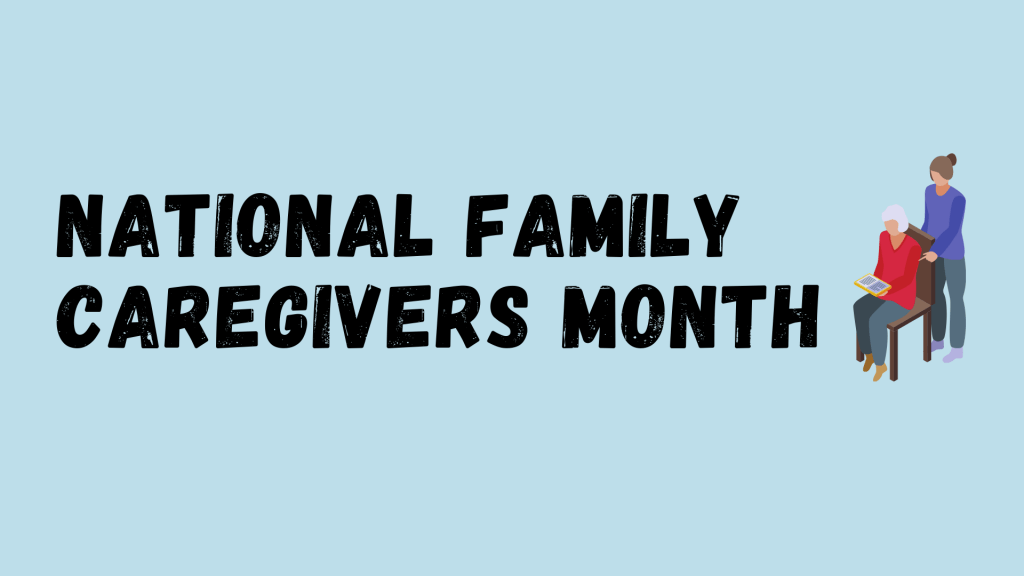Each November we observe National Family Caregivers Month, an annual opportunity to honor family caregivers all over the country.
National Family Caregivers Month is dedicated to:
- Highlighting family caregiver issues
- Celebrating the efforts of family caregivers
- Educating family caregivers
- Providing a platform that helps family caregivers self-identify with their peers
- Increasing the support available to family caregivers
To firmly define them, family caregivers are individuals who provide care for an adult family member or friend. Research shows that roughly 20% of all American adults do some form of caregiving.
That is a sizable chunk of our population that rarely gets the thought or support they deserve. Most of us can think of at least one person in our life that provides care for an adult family member. In fact, there’s a decent chance that you are currently caring for a relative or friend.
One reason there’s not a larger, sustained conversation about family caregivers is that caregiving can often be an individual, internal struggle. It’s common for family caregivers to suffer in silence while they juggle a loved one’s life and their own.
As part of our participation in National Family Caregivers Month, we’ve taken a deep dive on the mental health implications of caregiving. If you or someone in your life is providing care for a loved one, it’s important to know the impact it can have on our mental health.

Mental Health of Caregivers
We wanted to cover the mental health implications of caregiving for two reasons. First, Sigmund serves the behavioral health community, so we’re always looking at the mental health aspects of treatment.
And second, we believe that the mental health of caregivers is something that needs more attention. If you’ve ever cared for a family member or watched a loved one do so, you know it takes a toll in a variety of ways. And the toll it takes often goes unnoticed and under-appreciated.
Being a caregiver can be an emotionally and physically stressful experience. The responsibility can require caregivers to put others’ needs before their own. Unfortunately, routinely sacrificing your time, energy, and wellbeing can lead to stress, anxiety, and/or depression.
It’s no surprise, then, that up to 70% of caregivers show symptoms of depression. And of that number, nearly half meet clinical criteria for major depression.
Signs of Depression in Family Caregivers
So much of caregiving can be a thankless and isolating job.
If a loved one gets ill or injured to the point where they require a caregiver, their condition can become the center of a family network’s attention. Though this is a natural instinct, it’s important to be mindful of the primary caregiver’s wellbeing, too.
Ideally, the care of a family member becomes a team effort. However, it’s not uncommon for the primary caregiver to become the sole caregiver. As the need for care persists or escalates, any focus on the caregiver’s mental health may take a back seat over time.
As a result, we’ve listed some signs of depression in family caregivers to look out for:
- Feelings of exhaustion, tiredness, tension, anger, helplessness
- Inability to sleep
- Feelings of guilt when engaging in activities that take you away from caretaking
- Avoiding activities that will take you away from caretaking because you feel guilty not caretaking
- Feeling unable to talk to others about your caregiving experience
- Having anticipatory anxiety about future caretaking responsibilities (upcoming appointments, new treatments, etc.)
- Feeling alone or without support in your role as caregiver
- Feelings of uncertainty and/or constant worrying
If any of these apply to you or the caregiver in your life, it may be time to reevaluate that caregiving environment.
For some more context regarding how stressful your environment is, check out this Caregiver Stress Meter. It’s an assessment developed by experts in the field to help determine the level of stress someone may be experiencing in their role as a caregiver.
It’s important to monitor your stress as a caregiver because, well, caregiving and stress go hand in hand. Research shows that caregivers suffer from higher levels of stress and frustration than non-caregivers.
In fact, caregiving fits the formula for chronic stress so well that it is used as a model for studying the health effects of chronic stress. Unfortunately, those consistent levels of stress can cause increased anxiety and depression symptoms.

Depressed caregivers are more likely to have coexisting anxiety disorders, issues with substance abuse, and chronic illness than caregivers who report no signs of depression.
Whether an existing issue is exacerbated by additional stress from caregiving, or the stress of caregiving leads to other issues, the health implications are real. The best way to deal with that stress and its mental health byproducts is to address them early and proactively.
Managing those stressors head-on is easier said than done, though. Lots of caregivers lack the awareness, or the time, to focus on their mental health from the start.
The initial caregiving period is typically hectic and brand new. Most family caregivers go into things without any previous training. It’s difficult to monitor your mental health while also learning how to provide adequate medical care on the fly.
Improving Mental Health of Caregivers
National Family Caregivers Month was established in part to support struggling caregivers. So, what can we do to help caregivers and protect their mental health?
If you’re someone with a caregiver in your life, here are some ways you can make an immediate positive impact:
- Help research or find education/support programs for caregivers. The caregiver themselves may not have the time or energy to actively pursue support in that way. That’s where you can come in – do the legwork for them so the choice to seek help is easier, and not another chore.
- Pitch in with the actual care. If you feel comfortable and it is appropriate to do so, try to take on some “shifts” to give the caregiver a break. Whether it’s consistent or sporadic, those breaks are precious and each one helps.
- Offer some form of financial support to alleviate the economic stress of caregiving. From helping to pay for more assistance/aid services to buying/preparing meals, there are plenty of ways to help shoulder the financial burdens of caregiving.
These are all great ways to help and will go a long way to making the caregiver feel supported and thought of.
However, just as caretaking can be a solitary struggle, it can also require an individual solution. It may be up to the caregiver to make changes themselves to improve to their situation in a meaningful way.
The best way to take matters into your own hands is to engage in preventative behaviors. Ask yourself what kind of therapeutic protocols you can put in place to protect your mental health, such as:
- Periodically addressing the impacts of your caregiver responsibilities with your primary care physician. They can provide guidance on the physiological implications of caregiving.
- Examining your caregiving situation with a therapist or mentor so that you can actively work through current challenges and prepare for upcoming stressors. At the very least, having an outlet that allows you to vent and simply voice frustrations, and be listened to, can be invaluable support.
- Establishing clear expectations and boundaries early on in the caregiving process with both the person being cared for and the larger family unit. That way, everyone involved can get an awareness of your limits and needs before family roles are cemented.
- Seeking education or support programs dedicated to caregivers. Sometimes just spending time with others that share your experience and understand your struggle can be extremely therapeutic. The education available to you may be enlightening and the connection with others is healing.
- Engaging in activities that promote mental health, such as exercising and taking care of your body (eating healthy, getting enough rest). Your responsibility as a caretaker can be a consistent and indefinite stress in your life. Remaining healthy and active is one of the best ways to offset the mental and emotional hardships of any stressful situation.

Mental Health of Caregivers During COVID-19
As if caregiving wasn’t already challenging enough, COVID-19 has made things even more difficult. Caregivers have been forced to navigate an enormously disrupted healthcare system while also dealing with the virus in their own life. National Family Caregivers Month comes at a perfect time to remind us of this fact.
Many caregivers already felt overwhelmed. Now, as COVID-19 has overwhelmed all of us, caregivers must shoulder this new burden on top of their caregiving responsibilities. There are the obvious new, more logistical challenges of remote care, social distancing, limited medical services, and resources to deal with.
However, COVID-19 has some very serious mental health implications as well. There are specific things about an event like a pandemic that stresses us out and leads to mental health issues, which we covered in-depth here. Those stressors are now weighing caregivers down along with the daily stressors of caregiving.
For this immediate issue of navigating both pandemic stress and caregiving stress, we wish we had a better solution. The unfortunate reality is that pathways to support for caregivers are harder to access than usual.
However, we hope the circumstances of the pandemic don’t discourage caregivers from pursuing the support they need. Those options are still available. It may just take a bit more effort to get there, but your mental health is worth that.
And for those of us that don’t carry the burden of caregiving, we can at least be more cognizant of the caregivers in our lives and how we can help them. If you can lend a hand in the ways we’ve suggested, it will probably have a larger positive impact than you think.
In a time when everyone needs a little more support, we should strive to extend some extra assistance and understanding to those of us who’ve given so much care to others.



